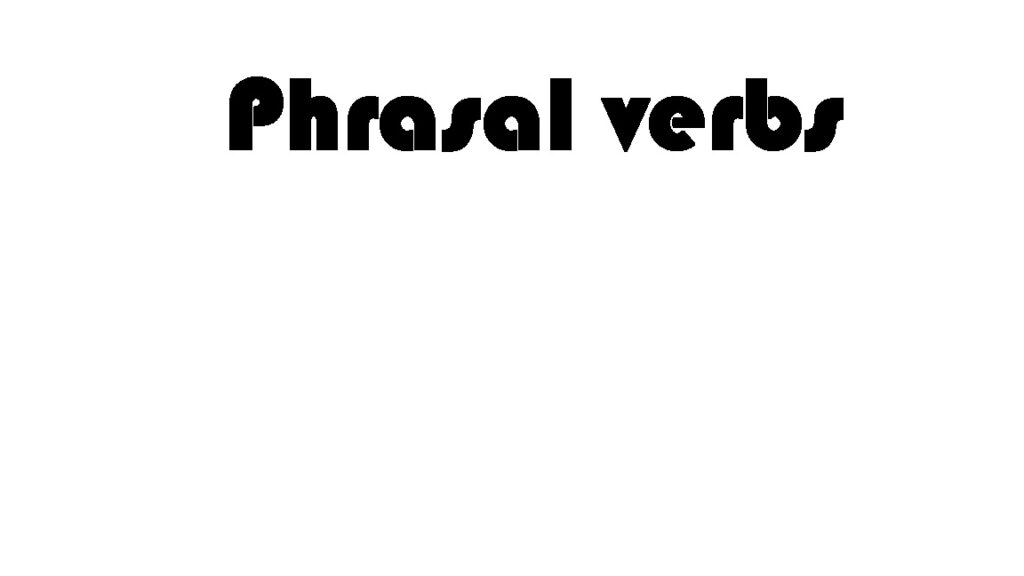What are phrasal verbs:
Phrasal verbs are combinations of a verb and one or more particles (adverbs or prepositions) that together form a single semantic unit with a distinct meaning. They are a unique feature of English language and play a significant role in both everyday conversations and written communication.
Phrasal verbs often have idiomatic or figurative meanings that may not be deduced from the individual words. The addition of particles can alter or extend the original meaning of the verb, creating nuances and adding depth to the language.
Here are a few key characteristics of phrasal verbs:
Structure: Phrasal verbs consist of a main verb followed by one or more particles. The particles can be adverbs or prepositions, and they may appear before or after the verb.
Meaning: Phrasal verbs have meanings that may differ from the literal interpretation of the verb and particle separately. The combination of the verb and particle creates a new, often idiomatic, meaning.
Inseparability and Separability: Phrasal verbs can be either separable or inseparable. In separable phrasal verbs, the verb and particle can be separated by the object of the verb. In inseparable phrasal verbs, the verb and particle cannot be separated.
Separable example: He turned off the TV. / He turned the TV off.
Inseparable example: She looked after her younger brother.
Usage: Phrasal verbs are commonly used in both formal and informal settings, including spoken language, written communication, and literature. They are prevalent in everyday conversations and are essential for understanding and expressing oneself fluently in English.
Learning and understanding phrasal verbs is crucial for language learners as it enables them to communicate effectively, comprehend idiomatic expressions, and grasp the subtleties of the English language.
Phrasal verbs most common Examples
They are common in English and often have idiomatic or figurative meanings that may not be predictable from the individual words. Here’s a full explanation of phrasal verbs with examples:
Break down: to stop working or functioning properly.
Example: My car broke down on the way to work this morning.
Bring up: to mention or introduce a topic.
Example: She brought up the issue of budget cuts during the meeting.
Call off: to cancel or terminate something.
Example: They called off the soccer match due to bad weather.
Carry out: to fulfill or perform a task or action.
Example: The scientists carried out a series of experiments to test their hypothesis.
Come across: to find or encounter something or someone unexpectedly.
Example: I came across an interesting article while browsing the internet.
Cut off: to disconnect or isolate someone or something.
Example: The storm cut off power to the entire neighborhood.
Get along: to have a harmonious or friendly relationship with someone.
Example: Despite their differences, they manage to get along quite well.
Give up: to stop doing or trying something.
Example: After many failed attempts, she finally gave up on learning the piano.
Look after: to take care of or be responsible for someone or something.
Example: Can you look after my dog while I’m away?
Put off: to postpone or delay something.
Example: They decided to put off the meeting until next week.
Take on: to accept or assume responsibility or a task.
Example: She took on the role of project manager for the new initiative.
Turn down: to reject or refuse an offer or request.
Example: They turned down his job offer because of the low salary.
Work out: to solve a problem or find a solution; to exercise.
Example: They need to work out the details of the contract before signing it.
Look up: to search for information in a reference source or online.
Example: If you don’t know the meaning of a word, you can look it up in the dictionary.
Break up: to end a relationship or a gathering.
Example: Tom and Sarah decided to break up after three years of dating.
Bring about: to cause something to happen.
Example: The new legislation will bring about significant changes in the education system.
Come up with: to produce or create something, especially an idea or solution.
Example: We need to come up with a plan to increase sales.
Get over: to recover from a difficult or painful experience.
Example: It took her a long time to get over the loss of her beloved pet.
Look forward to: to anticipate or be excited about something in the future.
Example: I’m looking forward to my vacation next month.
Put up with: to tolerate or endure something unpleasant.
Example: She has a lot of patience; she can put up with difficult customers.
Take off: to leave suddenly or rapidly.
Example: He took off from work early to attend his daughter’s school play.
Break in: to enter a building forcibly or illegally.
Example: Someone broke in and stole valuable items from our house.
Call back: to return a phone call or respond to a previous communication.
Example: I missed his call, so I need to call him back later.
Fall apart: to disintegrate or break into pieces.
Example: The old book fell apart when I opened it.
Go through: to experience or endure a difficult or challenging situation.
Example: He went through a lot of hardships before achieving success.
Look out: to be vigilant or watchful.
Example: Look out for cars when you cross the street.
Stand up: to rise from a sitting or lying position.
Example: Please stand up and introduce yourself to the class.
Work on: to focus on or make an effort to improve something.
Example: I need to work on my presentation skills for the upcoming conference.
Bring in: to introduce or involve someone or something new.
Example: The company decided to bring in a consultant to help with the project.
Turn up: to arrive or appear unexpectedly or without prior notice.
Example: She didn’t RSVP, but she turned up at the party anyway.
“bring about” and “bring in”
Certainly! Although both “bring about” and “bring in” involve the word “bring,” they have different meanings and usage:
Bring about: This phrasal verb means to cause or make something happen. It implies being instrumental in bringing a change or result. It is often used when discussing the initiation or creation of a particular situation or outcome.
Example 1: The new government policies brought about a significant improvement in the economy.
Here, the new government policies caused or initiated a positive change in the economy.
Example 2: The discovery of antibiotics brought about a revolution in medicine.
The discovery of antibiotics caused a significant and transformative change in the field of medicine.
Bring in: This phrasal verb means to introduce or involve someone or something new. It implies the act of bringing someone or something from outside into a particular place or situation.
Example 1: The company decided to bring in a new marketing team to boost sales.
Here, the company is introducing or involving a new marketing team to improve sales.
Example 2: The school decided to bring in guest speakers to enhance the students’ learning experience.
The school is introducing or involving guest speakers to provide additional knowledge and perspectives to the students.
In summary, “bring about” refers to causing or initiating a change or outcome, while “bring in” refers to introducing or involving someone or something new into a particular context or situation.
Find us on Facebook
Practice Digital SAT

